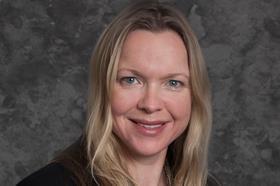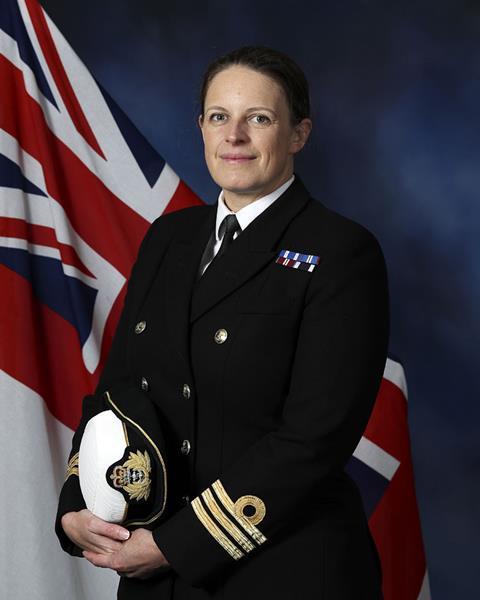Fiona Cain met with Commander Ally Pollard, Royal Navy, to discuss their experiences of diversity in the workplace and how the focus has changed during their careers
The Chinese proverb 'We help each other in the same boat and move forward hand in hand' seems apt for Ally and my discussion about diversity. Our careers have both centred around ships, Ally having served in numerous warships, while I have resolved countless issues regarding ship construction.

We both started our careers over 25 years ago, having grown up in England at a time when there was a queen on the throne and a female prime minister. For Ally, as a teenager, this helped her believe that being a woman should not prevent her taking on any career; she thought it would be an exciting time to join the Royal Navy and to take on the challenge of being one of the first female Royal Naval officers at sea (even though women had only been permitted to serve at sea on operational warships since 1991 and, prior to 1993, women - except nurses - in the Royal Navy served as members of the separate Women’s Royal Naval Service branch). As a lieutenant, Ally became one of the first women to command a Royal Navy warship and, more recently, as a Commander, commanding the Type 23 Duke Class Frigate, HMS Northumberland.
When I joined the legal profession in the 1990s, women had been practising as solicitors for 70 years. Through the likes of Ally McBeal and This Life, TV showed us the perceived life of a female lawyer. Even so, when I qualified as a solicitor at the turn of the century, two thirds of the profession were still male. I had completed my training contract at a new and dynamic law firm, Curtis Davis Garrard (which merged with Haynes Boone in 2016), but I had only one female colleague, an associate, and as I was representing clients in the male dominated shipping industry, it was rare to have female clients or female role models in my professional circle.

We have both witnessed a positive change in the diversity of our respective workplaces over the course of our careers. Across Haynes Boone’s 19 offices worldwide, 53% of my colleagues are now diverse (disability, ethnicity, gender, LGBTQ+ and race) and 26% of the partnership are women. For the Royal Navy, 10.7% of Regular Forces and 16.5% of Reserves are women. These statistics have been assisted by initiatives like the 'Made in the Royal Navy' ad campaign which shows a Royal Navy career is possible regardless of gender and race.
The increase in female role models in our professions is a refreshing improvement. A significant development for the Royal Navy is that there are now female commanding officers for the four main training establishments. As a result, most recruits to the Royal Navy now have a woman as their first commanding officer, which Ally sees as a positive for all new recruits, not just women.
We are encouraged that today, women do not always need to be trailblazers; they do not need to be the first woman to take a particular career path; women starting their careers today have more opportunity to succeed as those before them have opened many of the doors already. A new female lawyer at Haynes Boone today will not be the first female partner, nor be the first to take on senior management roles, nor the first to ask for maternity leave nor have to prove that part-time/flexible working does work. They have colleagues and role models who have already taken these steps and are on hand to provide guidance and career path advice based on experience.
Both Ally and I have, at times, been struck by the absence of female mentors for our own careers, resulting from the limited number of women ahead of us in our respective professions. We are both encouraged that this is not likely to be as significant an issue for our younger colleagues who have the benefit of our experience (and other women like us) to assist and support them in their careers.
The gender pay gap continues to be an issue in the legal profession (and for other professions). A recent report by Gapsquare and Next 100 Years cited one of the key issues being a 'lack of transparency in areas of reward and career progression'. I was therefore surprised to learn from Ally that this is not an issue in the Royal Navy as everyone knows what a person of a particular rank and seniority earns, and that this is not impacted by gender.
We have both witnessed an increase in the support available for diversity. Both the Royal Navy and Haynes Boone truly recognise the importance of inclusion and the benefits of a diverse workplace. Hayne Boone has various inclusion networks, including the Women’s Initiative Network and the Military Veterans and Partners Network, which provide support for their members within the firm and fosters intra firm awareness (and provide external support as well, for example by way of financial assistance to organisations such as the Royal Naval Association). The Royal Navy has similar networks as part of its commitment to equality and diversity.
Looking at our own experiences, Ally and I are both thrilled by the opportunities that exist for women today in our professions. The change has not happened overnight and while the jury may still be out on whether there is gender equality today, women certainly have opportunities to achieve this and often with the helping hand of others who have been in the same boat.
Fiona Cain is counsel in the energy disputes team of Haynes Boone in London and a member of the firm’s Women’s Initiative Network































No comments yet